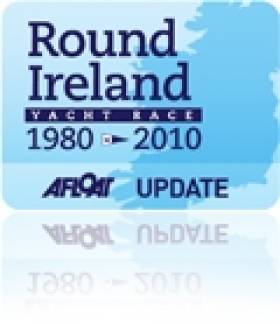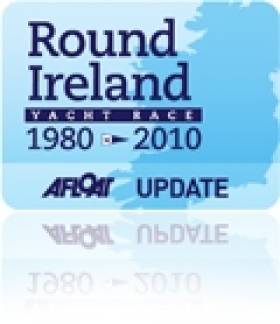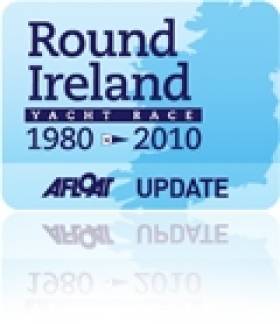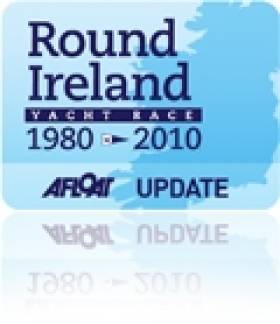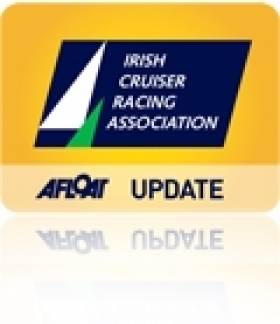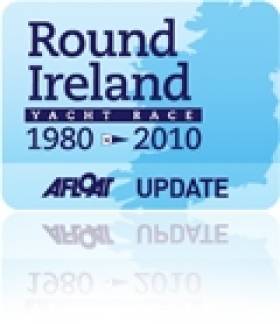Displaying items by tag: Wicklow SC
Wicklow Commodore Charlie Kavanagh might be right, tomorrow's Round Ireland start might be like 'watching paint dry'. Lets hope not but an adverse tide flooding northwards all afternoon plus a forecasted light wind means little progress down the East coast for hours tomorrow after the noon start. Wind guru Mike Broughton brings afloat.ie readers up to date with the best prospects for wind tomorrow on our podcast here.
More on the Round Ireland Yacht Race:
Round Ireland Yacht Race 2010 Review
Round Ireland Yacht Race, Ireland's top offshore fixture
A Round up of 80 stories on the 2010 Round Ireland Yacht RaceRound Ireland Start Time is Noon on Sunday
The start of the 2010 Round Ireland Yacht Race is this Sunday 20th June at 12 noon. Watch the biennial race unfold as up to 35 yachts set sail from Wicklow Bay, with entertainment before and after, including live music in Wicklow Sailing Club and aeroplane display. Click here for a full timetable of entertainment events for the weekend. We'll be following the fleet Round Ireland right here on Afloat.ie, you can view all our posts on the race here.
More on the Round Ireland Yacht Race:Round Ireland Yacht Race 2010 Review
Round Ireland Yacht Race, Ireland's top offshore fixture
A Round up of 80 stories on the 2010 Round Ireland Yacht RaceRound Ireland Yacht Race Fleet to Make 37 Entries
"It probably won't make 40 but 37 boats is highly likely" said Round Ireland Organiser Dennis Noonan tonight. It is the most accurate prediction for a fleet already assembling in Wicklow for the 30th edition of the Round Ireland race. Despite the size, nearly half that of the record numbers of the 1990s, it is a still a very respectable anniversary fleet. The race has also attracted a new sponsor, local firm Conway Media.
More on the Round Ireland Yacht Race:
Round Ireland Yacht Race 2010 Review
Round Ireland Yacht Race, Ireland's top offshore fixture
A Round up of 80 stories on the 2010 Round Ireland Yacht RaceReport on Race 4 – Pwllheli – Causeway - Bardsey – India Nt - Wicklow – 5th June 2010.
From an entry list of 28 sailing boats, 14 boats came to the line in Pwllheli for the 4th ISORA race – 75 miles to Wicklow. Due to tidal difficulties the race start time was brought forward to 07.15. The weather forecast was for light winds increasing to Force 3 or 4 and veering North West. However a reasonable wind of 8kts in Pwllheli, early in the morning convinced the Race Organiser to hold the planned course to Wicklow. The wind held well for the beat to Causeway and for the tight spinnaker reach towards Bardsey. “ Galileo” was first around Causeway followed by “Tsunami”.
As the fleet approached Bardsey the wind dropped to virtually nothing. “Tsunami” had just enough wind to creep around Bardsey first while the remainder of the fleet wrestled with the possibility of the tide pushing them through the sound and around the wrong side of Bardsey.The wind picked up from the West for “Tsunami” after the rounding Bardsey and a fast passage to Wicklow was expected. This was not to be as the wind died again and a heavy sea mist appeared. There was little or no wind for 3-4 hours. When eventually the mist lifted and the westerly wind appeared again, only four boats were visible – “Tsunami”, “Raging Bull”, “Just Enough” and “Lula Belle”.
The four boats continued across the Irish Sea, within sight of each other, with the wind shifting all the time and disappearing at times. At approximately 02.30 on Sunday morning “Raging Bull” rounded Nt India followed by “Tsunami” and “Just Enough”. “Lula Belle” could not be seen. The wind picked up again and soon there was 14kts of wind from the North West and the boats roared towards the Wicklow finish.
The wind had not finished playing its tricks. The usual “Wicklow Hole” had formed within one mile of the finish line and the boats ground to a halt as they arrived there. Very tricky sailing was required to manoeuvre in the light winds and the then strong south going tide to the finish.The first boat to cross the finish line was “Raging Bull” at 04:01, who only managed to take 2nd Overall and 1st in Class 1. It was followed closely by “Tsunami” who took 2nd in Class 1 and 3rd Overall. “Just Enough” appeared over the finish line at 04:28 to take the Overall Win and Class 2. “Lula Belle” continued to battle the fluky conditions and finished at 12:25 to take 4th Overall and 2nd Class 2.
There were no other finishers.
The next race is next weekend 13th June, a Sunday Day Race from Dun Laoghaire. It is hoped that some new boats will use this race as a “taster” for ISORA. An Après Sail get together is arranged in the NYC after the race.
Results and Entry form race five is attached.
Planning to do the Round Ireland Yacht Race this month?
Planning to do this year's Round Ireland Yacht Race? You could do a lot worse than listen in to how Galway's Aodhan Fitzgerald put together a team of friends to win the 2008 race. Also on Afloat.ie are navigation tips from tactician Brian Mathews. There is little over a fortnight to the race start in Wicklow. Notice of race here. Get your crew together now for the 16th circumnavigation!
More on the Round Ireland Yacht Race:
Round Ireland Yacht Race 2010 Review
Round Ireland Yacht Race, Ireland's top offshore fixture
A Round up of 80 stories on the 2010 Round Ireland Yacht RaceMills Designs to the Fore in Commodore's Cup
Yacht designer Mark Mills of Wicklow, the Irish Sailor of the Year, will be represented by at least five sailing designs on three different teams at the next Commodores Cup to be held off Cowes in August. It will be of interest for ICRA members to know that with some teams still being finalized, the tally so far includes the custom IRC 39 Mariners Cove in the Ireland team, Hong Kong returning with the Summit 40 Blondie and the custom 40 Mandrake II (ex Ngoni), and the South Africans joining the event with the Landmark 43 Windpower and the Summit 40 Tokoloshe.
Round Ireland Book Goes on Sale
Fred Drew, president and a former commodore of Wicklow SC, has launched a compilation of stories about the Round Ireland Yacht Race. The book goes on Sale next week from the publishers at Originalwriting.ie/bookshop/ or directly from WSC in June. Apart from two bookshops in town the book will not be available in main street bookshops
Racing Round Ireland is a collection of articles and stories about the Round Ireland Yacht Race which is held every two years and begins and ends in Wicklow.The race is organised and run by the Wicklow Sailing Club in association with the Royal Ocean Racing Club, the governing body for offshore racing.
Recognised as one of the most challenging events in the international offshore sailing world it has attracted some of the world’s greatest sailors and some of the most beautiful and iconic yachts.
But the backbone of the race is provided by the ‘ordinary’ Club sailor, some of whom have competed in the race ten or more times and the experiences of some of these in the 1994 race form the heart of this book.
Although Fred admits to never having sailed in the race himself (Although he knows someone who has) he has been associated with the race in one form or another since its inception.
In recent years he has been responsible for the race results programme and maintaining the race archive.
More on the Round Ireland Yacht Race:
Round Ireland Yacht Race 2010 Review
Round Ireland Yacht Race, Ireland's top offshore fixture
A Round up of 80 stories on the 2010 Round Ireland Yacht Race


























